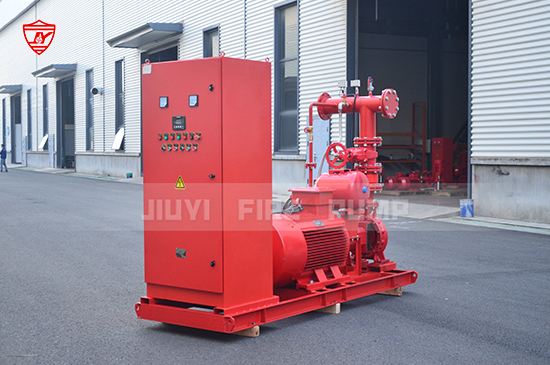Fire pumps play a critical role in emergency fire protection systems, but they can generate significant noise and vibration during operation. Excessive sound can disturb building occupants, and uncontrolled vibration may lead to mechanical wear, piping damage, or even system failure over time.
This article explains how to reduce fire pump noise and vibration using proven design practices, equipment upgrades, and maintenance techniques.

One of the most effective ways to reduce vibration is to install vibration isolators under the fire pump base, motor, and controller. These can include:
Neoprene isolation pads
Spring mounts
Cork-rubber composite pads
They absorb the mechanical energy produced during operation and prevent it from transferring to the building structure.
Rigid pipe connections can transmit vibration directly from the pump into the piping system. Instead, use flexible connectors (also called rubber expansion joints or bellows) on suction and discharge lines. These connectors:
Absorb movement
Compensate for thermal expansion
Reduce stress on pump flanges
Always select flexible connectors rated for fire protection systems and compliant with NFPA 20.
Misalignment between the pump and motor shaft is a major cause of vibration. During installation and maintenance, use precision alignment tools (laser or dial indicators) to align the pump and motor within manufacturer-recommended tolerances.
Misaligned shafts not only cause vibration but also wear out bearings and seals prematurely.
Your fire pump should be mounted on a solid concrete base with sufficient mass to resist pump forces. According to NFPA 20, the foundation should weigh at least three times the combined weight of the pump and driver.
The base should be flat, level, and isolated from other building structural elements to avoid noise transmission.
If the pump is installed in a shared space, consider enclosing the system in an acoustically insulated fire-rated room or cabinet. This helps contain noise and keeps it from reaching office spaces, lobbies, or adjacent rooms.
Choose materials with high Sound Transmission Class (STC) ratings, and seal gaps or duct openings with acoustic barriers.
Over time, worn bearings or loose couplings can increase vibration and noise levels. Implement a regular inspection schedule to:
Lubricate bearings per OEM specifications
Check for unusual bearing noise or heat
Inspect couplings for cracks, looseness, or misalignment
Early detection of wear can prevent larger mechanical failures.
An unbalanced impeller can produce loud humming or rattling noises. During pump repair or refurbishment, always have the impeller dynamically balanced by a professional technician.
This reduces stress on the motor and pump components, leading to quieter, more stable operation.
Running the fire pump too far off its best efficiency point (BEP) can cause hydraulic instability, leading to cavitation and noise. Ensure the pump is properly sized and operates within the recommended pressure and flow range.
If your system requires frequent operation outside of this range, consult with a fire pump engineer to adjust sizing or system design.
Reducing fire pump noise and vibration enhances occupant comfort, extends equipment lifespan, and prevents costly repairs. With the right foundation, alignment, isolation techniques, and proactive maintenance, you can ensure your fire pump runs quietly and smoothly.
Prioritize proper installation and don't ignore the warning signs of excessive vibration—it’s a signal your system may be under stress.